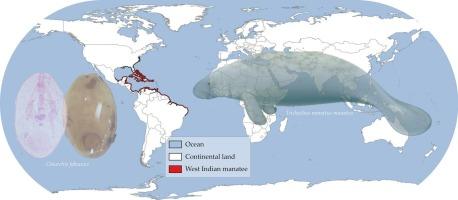Occurrence of Chiorchis fabaceus (Trematoda: Cladorchiidae) in a wild Antillean manatee (Trichechus manatus manatus): New parasitological data for this imperilled sirenian
IF 1.4
Q3 PARASITOLOGY
Veterinary parasitology, regional studies and reports
Pub Date : 2024-11-16
DOI:10.1016/j.vprsr.2024.101164
引用次数: 0
Abstract
Parasites impact wildlife populations and ecosystem health, thereby demanding regular monitoring. As part of the national conservation effort to preserve the free-ranging sirenians in Colombia, a parasitological survey was conducted between 2011 and 2023 on naturally deceased Antillean manatees (Trichechus manatus manatus). A total of 17 stranded carcasses were analysed for the occurrence of parasites. Herein, trematode adult stages were recovered from the stomach, small intestine, caecum and colon of an adult male manatee and microscopically analysed. Additionally, molecular analysis was conducted based on an almost complete coding sequence of the ITS1–5.8S-ITS2, partial sequence of 18S and 28S ribosomal DNA (rDNA) genes. Phylogenetic analysis clustered the trematode sequences within Chiorchis fabaceus species, thus constituting the first adult-based sequences isolated for the species. Presented data contribute to a better understanding of the sirenian parasite diversity.

在一只野生安的列斯海牛(Trichechus manatus manatus)体内发现了 Chiorchis fabaceus(吸虫纲:Cladorchiidae):这种濒危海牛的新寄生虫学数据
寄生虫会影响野生动物数量和生态系统健康,因此需要定期监测。作为哥伦比亚国家保护散养海牛工作的一部分,2011 年至 2023 年期间对自然死亡的安的列斯海牛(Trichechus manatus manatus)进行了寄生虫调查。共对 17 具搁浅的海牛尸体进行了寄生虫分析。在此,我们从一只成年雄性海牛的胃、小肠、盲肠和结肠中提取了吸虫成虫,并进行了显微镜分析。此外,还根据几乎完整的 ITS1-5.8S-ITS2 编码序列、18S 和 28S 核糖体 DNA(rDNA)基因的部分序列进行了分子分析。系统进化分析将该吸虫序列聚类在 Chiorchis fabaceus 种内,从而首次为该物种分离出基于成虫的序列。所提供的数据有助于更好地了解寄生虫的多样性。
本文章由计算机程序翻译,如有差异,请以英文原文为准。
求助全文
约1分钟内获得全文
求助全文
来源期刊
CiteScore
2.90
自引率
7.10%
发文量
126
审稿时长
97 days
期刊介绍:
Veterinary Parasitology: Regional Studies and Reports focuses on aspects of veterinary parasitology that are of regional concern, which is especially important in this era of climate change and the rapid and often unconstrained travel of people and animals. Relative to regions, this journal will accept papers of the highest quality dealing with all aspects of disease prevention, pathology, treatment, epidemiology, and control of parasites within the field of veterinary medicine. Also, case reports will be considered as they add to information related to local disease and its control; such papers must be concise and represent appropriate medical intervention. Papers on veterinary parasitology from wildlife species are acceptable, but only if they relate to the practice of veterinary medicine. Studies on vector-borne bacterial and viral agents are suitable, but only if the paper deals with vector transmission of these organisms to domesticated animals. Studies dealing with parasite control by means of natural products, both in vivo and in vitro, are more suited for one of the many journals that now specialize in papers of this type. However, due to the regional nature of much of this research, submissions may be considered based upon a case being made by the author(s) to the Editor. Circumstances relating to animal experimentation must meet the International Guiding Principles for Biomedical Research Involving Animals as issued by the Council for International Organizations of Medical Sciences (obtainable from: Executive Secretary C.I.O.M.S., c/o W.H.O., Via Appia, CH-1211 Geneva 27, Switzerland).

 求助内容:
求助内容: 应助结果提醒方式:
应助结果提醒方式:


